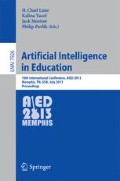Abstract
Exploratory Learning Environments (ELE) provide a rich educational environment for students, but challenge teachers to keep track of students’ progress and to assess their performance. This paper proposes an algorithm that decomposes students complete interaction histories to create hierarchies of interdependent tasks that describe their activities in ELEs. It matches students’ actions to a predefined grammar in a way that reflects students’ typical use of ELEs, namely that students solve problems in a modular fashion but may still interleave between their activities. The algorithm was empirically evaluated on peoples interaction with two separate ELEs for simulating a chemistry laboratory and for statistics education. It was separately compared to the state-of-the-art recognition algorithm for each of the ELEs. The results show that the algorithm was able to correctly infer students’ activities significantly more often than the state-of-the-art, and was able to generalize to both of the ELEs with no intervention. These results demonstrate the benefit of using AI techniques towards augmenting existing ELEs with tools for analyzing and assessing students’ performance.
Access this chapter
Tax calculation will be finalised at checkout
Purchases are for personal use only
Preview
Unable to display preview. Download preview PDF.
References
Amershi, S., Conati, C.: Automatic recognition of learner groups in exploratory learning environments. In: Ikeda, M., Ashley, K.D., Chan, T.-W. (eds.) ITS 2006. LNCS, vol. 4053, pp. 463–472. Springer, Heidelberg (2006)
Amir, O., Gal, Y.: Plan recognition in virtual laboratories. In: Proceedings of the 22nd International Joint Conference on Artificial Intelligence, IJCAI (2011)
Konold, C., Miller, C.: TinkerPlots Dynamic Data Exploration 1.0. Key Curriculum Press (2004)
Pawar, U.S., Pal, J., Toyama, K.: Multiple Mice for Computers in Education in Developing Countries. In: Conference on Information and Communication Technologies and Development, pp. 64–71 (2007)
Reddy, S., Gal, Y., Shieber, S.M.: Recognition of users’ activities using constraint satisfaction. In: Houben, G.-J., McCalla, G., Pianesi, F., Zancanaro, M. (eds.) UMAP 2009. LNCS, vol. 5535, pp. 415–421. Springer, Heidelberg (2009)
Yaron, D., Karabinos, M., Lange, D., Greeno, J.G., Leinhardt, G.: The ChemCollective–Virtual Labs for Introductory Chemistry Courses. Science 328(5978), 584 (2010)
Author information
Authors and Affiliations
Editor information
Editors and Affiliations
Rights and permissions
Copyright information
© 2013 Springer-Verlag Berlin Heidelberg
About this paper
Cite this paper
Uzan, O., Dekel, R., Gal, Y.(. (2013). Plan Recognition for ELEs Using Interleaved Temporal Search. In: Lane, H.C., Yacef, K., Mostow, J., Pavlik, P. (eds) Artificial Intelligence in Education. AIED 2013. Lecture Notes in Computer Science(), vol 7926. Springer, Berlin, Heidelberg. https://doi.org/10.1007/978-3-642-39112-5_69
Download citation
DOI: https://doi.org/10.1007/978-3-642-39112-5_69
Publisher Name: Springer, Berlin, Heidelberg
Print ISBN: 978-3-642-39111-8
Online ISBN: 978-3-642-39112-5
eBook Packages: Computer ScienceComputer Science (R0)

